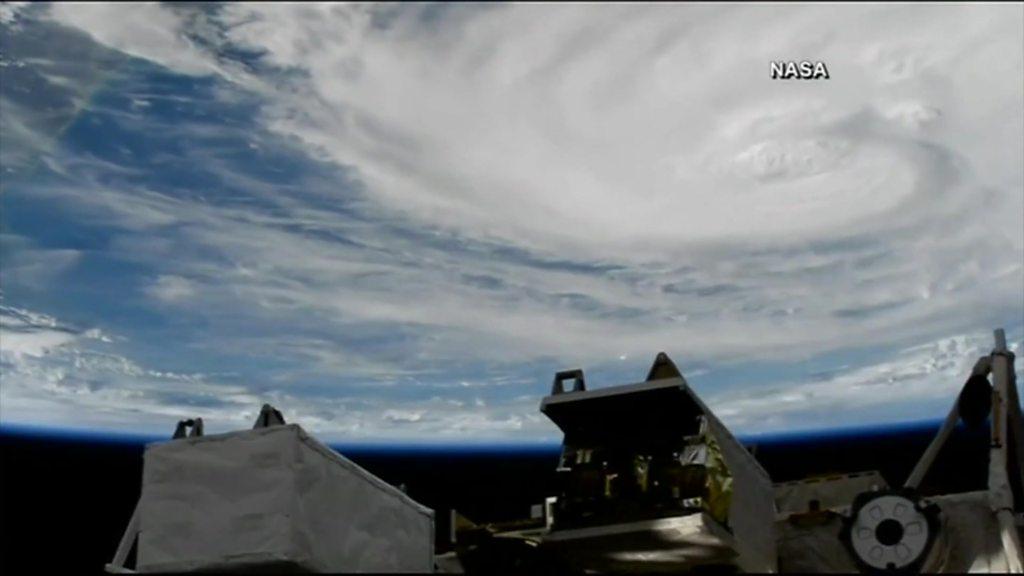Hurricane Harvey will be major disaster: Texas governor
- Published
Parts of the central Texas coast have been battered by hurricane winds
Texas is facing a "very major disaster" as Hurricane Harvey approaches its coastline, the state's governor says.
It is now a category four storm as it powers across the Gulf of Mexico. It is due to make landfall on Texas' central coast very late on Friday.
Greg Abbott has asked for more federal aid to cope with the storm, which may be the worst to hit the US in 12 years.
The National Hurricane Center said storm surges may bring life-threatening floods in and around Houston.
At 18:00 (23:00 GMT), the storm was 45 miles (70 km) east of Corpus Christi, with maximum sustained winds of 130mph (215 km/h), the NHC said.
The storm may bring 40in (102cm) of rain and 12ft (3.5m) storm surges, say forecasters.
Mr Abbott said Harvey was now "turning into a very complex and dangerous hurricane". It is likely to strike at the heart of Texas's oil refining industry, with Corpus Christi, a port city of 320,000 people, in the path of the storm.
In a letter to President Donald Trump, external requesting federal aid, Mr Abbott said: "The storm surge, coupled with the deluge of rain, could easily lead to billions of dollars of property damage and almost certainly loss of life."
The White House said Mr Trump is likely to visit Texas early next week.
How bad is Harvey?
Nick Miller has the forecast for Texas as Harvey hits
The National Weather Service said on Friday, external it expected Harvey to make landfall as a category three hurricane, out of a maximum of five. Storms usually lose force when they reach land.
If it does, it will be the strongest storm to hit the US since October 2005, when Hurricane Wilma struck the coast of Florida, external.
Wilma left 87 people dead, and was part of a record-breaking hurricane season that included Katrina, which devastated New Orleans and killed nearly 2,000 people in August of that year.
However, Mr Abbott warned it could even make landfall as a category four. The last category four storm to hit the US was Charley in August 2004.
According to the National Hurricane Center (NHC), Harvey's wind speed is currently 130mph, though gusts are even stronger.
What are the dangers?
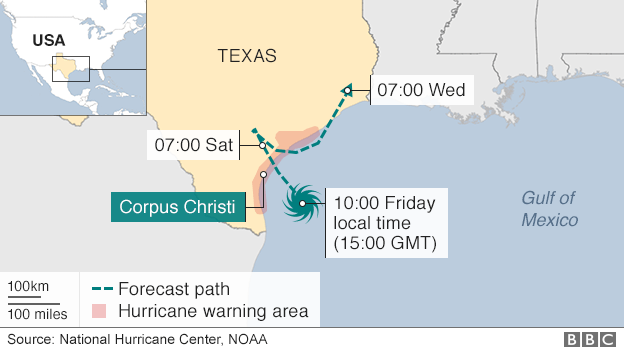
While Harvey is packing strong and potentially devastating winds, the biggest threats to Texas are rainfall and the storm surge.
Meteorologists are warning of extremely high volumes of rainfall as the storm stalls over the middle Texas coast.
They say Harvey could remain in the area, dumping rain until the middle of next week.
Oil-rich Houston, the fourth biggest city in the US, could face up to 20in of rain over the coming days, officials there said.
On top of that, the central Texas coast is likely to see a significant storm surge - this happens when low pressure at sea "lifts" tides to a level higher than normal, up to 12ft in this case, and high winds then blow the water inland.
The NHC said it expected "catastrophic flooding" across the coast and in some inland areas throughout south-east Texas.
Parts of Texas are already seeing, external a storm surge 2.5ft above normal.
Tomasz Schafernaker takes a look at the formation of Cape Verde-type hurricanes and where their energy comes from.
About 45% of US oil refinery takes place on the Gulf of Mexico coast, and Corpus Christi is an important port for the industry.
Crude oil production has slowed down by about 20% to prepare for the storm, and fears Harvey could lead to a shortfall in fuel have helped drive up prices.
What is the latest?
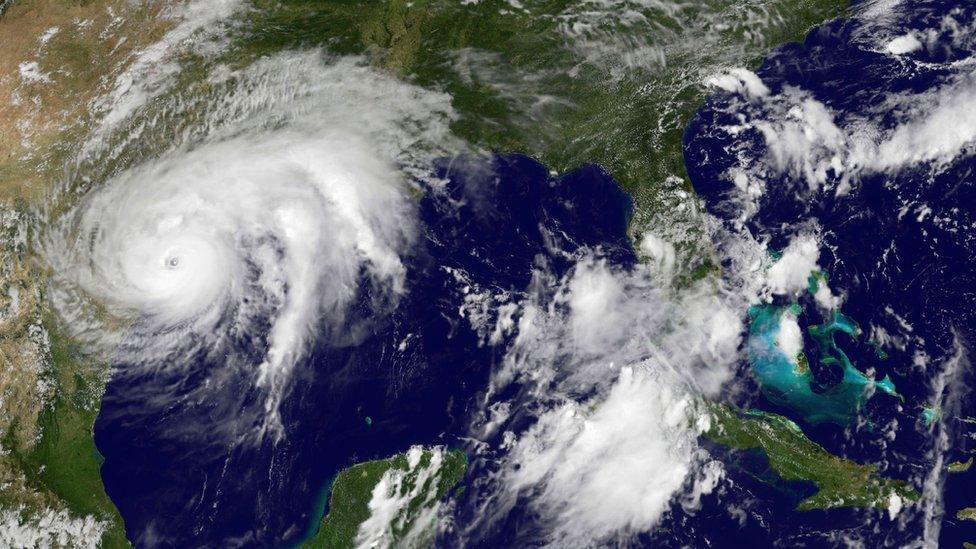
While no mandatory evacuations have taken place, Corpus Christi Mayor Joe McComb encouraged people living in low-lying areas to leave.
President Trump has also been urging people to heed the advice of authorities.
Allow X content?
This article contains content provided by X. We ask for your permission before anything is loaded, as they may be using cookies and other technologies. You may want to read X’s cookie policy, external and privacy policy, external before accepting. To view this content choose ‘accept and continue’.
Long queues of cars have been spotted leaving central Texas and the British band Coldplay cancelled a Friday night concert in Houston.
At least 20,000 passengers on three cruise ships have been unable to disembark in Galveston, Texas, cruise operator Carnival Corp said.
The Houston Chronicle reported they, and the passengers on one other ship, may need to stay out at sea until the middle of next week.
Meanwhile, Driscoll Children's Hospital in Corpus Christi has flown at least 10 babies from its neonatal intensive care unit to hospitals further inland, due to fear of power failures.
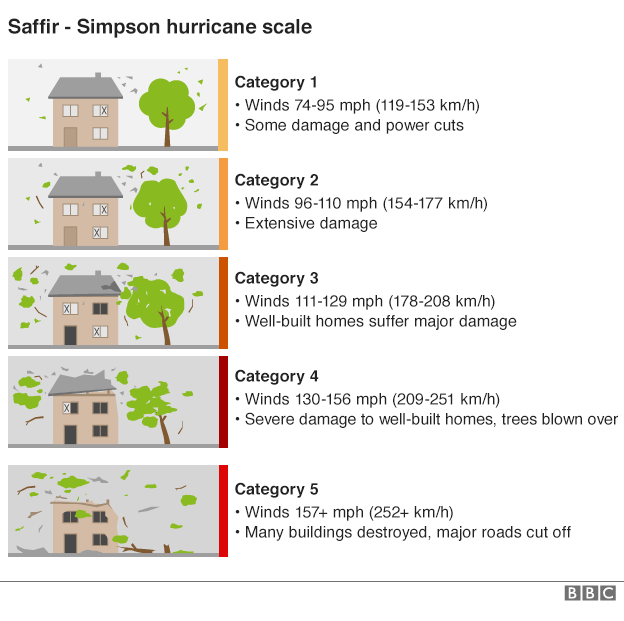
- Attribution
- Published25 August 2017
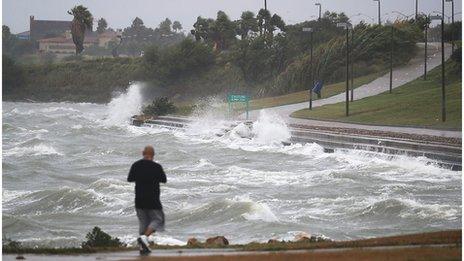
- Attribution
- Published1 October 2016
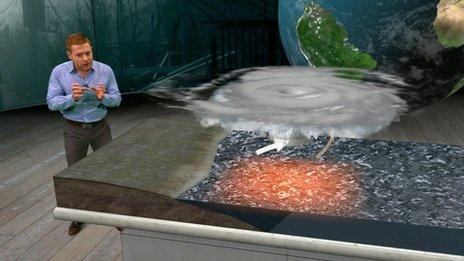
- Published25 August 2017
